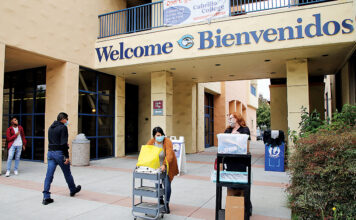SANTA CRUZ—The Santa Cruz County Board of Supervisors retooled the county’s syringe exchange program during its Dec. 10 meeting, limiting the amount that people can trade for clean ones on behalf of other people.
This practice, known as secondary exchange, is believed by advocates to be an effective way to get clean syringes to drug addicts, thus slowing the spread of needle-borne diseases.
Under the county’s one-for-one Syringe Services Program, intravenous drug users can exchange up to 100 used syringes for an equal amount of clean ones, and are allowed to do the same for an unlimited number of others.
The new policy, which begins in January, limits the secondary exchange to two people.
The move is seen as a way to combat the increasing number of dirty syringes found in public spaces.
“Our goal is zero syringe litter, and we are in line with everyone in the community, including the clients we serve, that public syringe liter is unacceptable,” said Santa Cruz County Health Services Agency Director Mimi Hall.
But Hall pointed out that limiting secondary exchange programs is not following “best practices” designed to stop disease.
Hall said the county will consider increasing the hours of the syringe services programs. The Watsonville location on Freedom Boulevard is open five hours per week, while the one on the county’s Emeline campus is open about 10 hours per week.
According to a report released in November by the Health Services Agency, two-thirds of intravenous drug users surveyed said they properly disposed of their used syringes.
In October, 362 pounds of syringe litter was collected from three collection kiosks in Santa Cruz, which equals an estimated 18,486 individual needles. The Syringe Services Program collected an additional 41,728. County officials estimate that, for every 1,000 needles properly disposed of, 10 are disposed of improperly as litter.
Supervisor John Leopold said that he was disappointed with the proposal, adding that he was dismayed by the lack of expanded hours.
“I’m slightly disappointed with the recommended actions, because I’m not sure they get at the core of the problem,” he said. “It seems like there are gaps in what we were told and what we’re actually going to do.”
The supervisors later agreed to amendments by Supervisor Bruce McPherson to expand the hours at both clinics by two hours per week and to establish a needle cleanup program.
“Families in Santa Cruz and Watsonville and elsewhere need to be assured that they will have safe public spaces,” he said. “That’s something we hear day in and day out.”
One group providing secondary syringe services is the Harm Reduction Coalition of Santa Cruz County, which hands out thousands to drug users. The group claims this year that its volunteers collected 6,600 more needles than it handed out. It is not affiliated with the county program.
The coalition is proposing a plan under which the group would keep its current Santa Cruz location, and would add home delivery of needles.
They said they would not hand out needles in any city, county or state parks.
The controversial issue drew dozens of people to the meeting, many of whom lined up to address the board.
Lisa Bates, who lives near the Emeline campus, said that the Syringe Services Program draws foot traffic through her neighborhood, with people screaming obscenities throughout the night, leaving trash and burglarizing vehicles.
Many people are selling their homes to get away from the problem, she said.
“It’s just become very stressful to live there,” she said.
Elliot Kelly, who described himself as a former prescription drug addict and a volunteer with secondary exchange programs, called the changes “ludicrous.”
Kelly said that adding hours and locations where addicts can exchange needles is essential.
“Until those things are addressed, I think secondary exchanges are great, because what we are doing is not poaching clients, we are reaching clients who the county is failing,” he said.
According to Supervisor Ryan Coonerty, Santa Cruz County gave out 600,000 needles in 2018. He compared that to Santa Clara, San Mateo and Monterey counties, which together handed out 450,000.
“So on a per-capita basis, we’re giving out 14 times more needles than all three of those adjacent counties combined,” he said.
Public health nurse Matt Nathanson, who works with the homeless population, suggested that the county collaborate with secondary exchange programs as a way to bolster its own program.
“…because they can extend our ability to outreach people in the community of people who are using substances,” he said. “In doing this work, if you can’t build trust with people, you’re not going to get them into treatment.”











